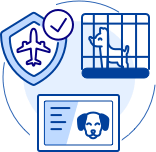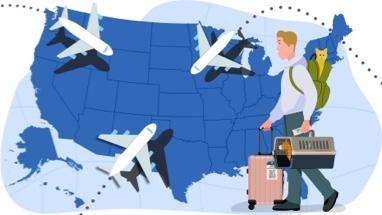Pet Travel From the United States to Canada
Travel Requirements Based on Pet Type
Carefully read ALL of the requirements related to your pet on this page.
- This page provides the most recent entry requirements and can change without notice.
- It is the responsibility of the veterinarian to make sure the pet has met all health requirements of the destination country before issuing a health certificate.
- Failure to meet the requirements may result in problems gaining certificate endorsement or difficulties upon arrival in the destination country.
- Health certificates must be legible, accurate, and complete.
Pet dogs OLDER than 8 months do NOT require any health certificate.
- Proof of rabies vaccination is all that is required for dogs in the following categories:
- any dog greater than 8 months of age
- assistance animals certified as guide, hearing or service dogs, if the person accompanying the dog to Canada is the user of the dog
- two or less pet dogs accompanied by their owner to Canada
- any dog exported on a temporary basis for competition in a show or trial, if at the time of importation proof of entry in a show or trial is provided.
- Rabies vaccination certificate as proof of rabies vaccination
- Required for all dogs greater than 3 months of age (with the exception of assistance dogs certified as a guide, hearing or service dogs which accompany their user into Canada)
- Issued by licensed vet, proving vaccination within 3 years of importation into Canada.
- Proof of rabies vaccination by documenting on a health certificate, if a health certificate is required.
Learn more about traveling with your dog from the U.S. to Canada
Pet dogs YOUNGER than 8 months old MAY require a health certificate from a licensed veterinarian in the United States. Please see below for more information:
The below information applies to non-commercial shipments of privately owned pets only. If you are shipping pets for commercial purposes, please view the requirements on Canada’s page of APHIS’ International Regulations (IRegs) website.
Unaccompanied dogs (puppies not traveling with their owner):
- Shipments of 1-2 dogs less than 8 months of age which travel unaccompanied are required to be examined and have a health certificate issued by a licensed veterinarian within 72 hours of arrival in Canada.
- The full travel requirements are described in the provided health certificate*. This certificate does not need to be endorsed by APHIS.
Health Certificate (63.24 KB)
Accompanied dogs (puppies traveling with their owner):
- Shipments of 1-2 dogs less than 8 months of age traveling with their owner are only required to travel with proof of current rabies vaccination*.
*Dogs younger than three months old are not required to be vaccinated for rabies but proof of the dog’s age must be available to Canadian Officials. All dogs greater than 3 months of age, with the exception of assistance dogs certified as a guide, hearing or service dogs which accompany their user into Canada, must have proof of current rabies vaccination to travel to Canada.
Learn more about traveling with your dog from the U.S. to Canada
Pet cats do NOT require any health certificate
- Rabies vaccination certificate - issued by licensed veterinarian, proving vaccination within 3 years of importation into Canada
- Kittens under 3 months of age exempt from rabies vaccination
- Date of vaccination and the type of vaccine must be on the vaccination certificate
Learn more about traveling with your cat from the U.S. to Canada.
Note: The Canadian Food Inspection Agency (CFIA) requires the Veterinary Services Trade Route Mapping Tool (646.62 KB) to be used. Exporters MUST use this mapping tool, not Google maps, not the USDA confirmed HPAI detections map, nor any other map. CFIA will start refusing shipments that do not meet these requirements. Please carefully read the details below.
CFIA prohibits the movement of all live birds (including pet birds), live poultry, and hatching eggs which originate from, or transit through trade restriction zones established due to detections of Highly Pathogenic Avian Influenza (HPAI) in poultry.
Exporters are advised to plan transit routes in advance of travel to avoid transit through restricted zones or otherwise risk delays or rejection of shipments.
Exporters MUST provide documentation to demonstrate the route of travel to Canadian border/port officials. This documentation must accompany the health certificate but is NOT endorsed by APHIS. The documentation must include:
- a map of the intended route of transit – must use the Veterinary Services Trade Route Mapping Tool (646.62 KB)(not Google maps)
- a statement attesting that the consignment has not traveled a route that transited any control zone for HPAI. Example: [Insert Commodity Type, e.g. Hatching eggs] covered by certificate(s) [Insert health certificate number] will travel in a closed conveyance via the following route. To the best of my knowledge, this route does not transit any restriction areas established due to detections of High Pathogenicity Avian Influenza (HPAI) in poultry.
- commodity being exported and certificate numbers associated with the shipment
- signature of the accredited veterinarian and date of signature
For live birds, live poultry, and hatching eggs traveling by air from the United States to Canada, in addition to the guidance above:
- The exporter should provide a map of their route from the place of origin to the first airport, to demonstrate that the first part of their travel does not transit through any restricted zones.
- For any layovers, rather than provide a map of the layover airport, the exporter can include a comment that the travel includes a second airport in the United States and this second airport is not located in a restricted zone.
Follow the steps in the document entitled "Veterinary Services Trade Route Mapping Tool Access Guide" below to access the Trade Route Mapping Tool.
Veterinary Services Trade Route Mapping Tool Access Guide (646.62 KB) - March 2025
The requirements for traveling with your pet are described in the health certificate. If submission will be via the Veterinary Export Health Certificate System (VEHCS), you may navigate directly to VEHCS without downloading this PDF.
Health Certificate (219.38 KB) - April 2024
Pet ferrets do NOT require any health certificate.
Ferrets over 3 months of age should have received a rabies vaccination within the 12 months prior to travel to Canada.
Rabies vaccinated ferrets should travel with a rabies vaccination certificate documenting the pet’s most recent rabies vaccination. The vaccination certificate should clearly identify your pet and must minimally include its sex, age, and breed. The rabies vaccination certificate must be signed by a licensed veterinarian of the United States.
Additional Information
Any ferret over 3 months of age traveling without proof of rabies vaccination can be immediately vaccinated upon arrival in Canada at a veterinary clinic without quarantine.
More information about pets can be found on the Canadian Food Inspection Agency web site. For pet travel requirements not listed, APHIS has not been officially informed by the foreign country about the requirements for your pet’s travel. We recommended that you contact a government official of the country you are traveling to for more information.
Country of destination contact information:
Countries Participating in the European Union
Austria
Belgium
Bulgaria
Croatia
Cyprus
Czech Republic
Denmark
Estonia
Finland
France
Germany
Greece
Hungary
Republic of Ireland
Italy
Latvia
Lithuania
Luxembourg
Malta
Netherlands
Northern Ireland*
Norway**
Poland
Portugal
Romania
Slovakia
Slovenia
Spain
Sweden
Switzerland**
* Northern Ireland is part of the United Kingdom (UK), but will continue to follow European Union (EU) requirements even though the UK is no longer part of the EU.
** Norway and Switzerland are not part of the EU but have adopted EU legislation for import of most species of live animals.
Need Help?
Still Have Questions?
USDA-Accredited Veterinarians
Contact a USDA-accredited veterinarian for questions about your destination country's entry requirements for pets (including any needed vaccinations, tests, or treatments) and for issuance of health certificates.
Find a USDA-Accredited Veterinarian
USDA Endorsement Offices
Contact your nearest APHIS Veterinary Export Trade Services Endorsement Office for questions about endorsing a health certificate for pets.
For VEHCS help see the VEHCS help page. Routine APHIS VEHCS processing services are staffed Monday through Friday from 7:00 AM to 4:30 PM Central Time (CT) excluding federal holidays, the time listed in VEHCS reflects GMT.
Looking for Another Country?
Find your destination country requirements by using the dropdown menu below. If your country is not listed in the menu, visit Pet Travel: Unknown Requirements.




